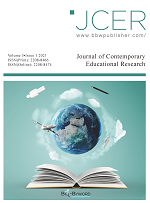Abstract
As a measure for higher engineering education in the new era to deal with a new round of scientific and technological revolution and industrial reform, China’s new engineering construction is an important strategic deployment to cultivate diversified and innovative engineering talents. In order to promote the new engineering construction in an all-rounded way, talent training is the key. Compared with traditional engineering talents, new engineering talents need to have richer values and normative knowledge, especially public policy qualities, which is the ability that new engineering talents should have in this complex and changeable environment. The EPP (Engineering and Public Policy) professional training model at Carnegie Mellon University provides useful practical experience for the cultivation of public policy qualities of new engineering talents.
References
Chen Y, 2017, Challenges and Responses: Reflections on Engineering Practice Education under the Background of New Engineering. Journal of Nanjing University of Aeronautics and Astronautics (Social Science Edition), (4): 89-91.
Monteiro F, Leite C, Rocha C, 2019, Ethical Education as a Pillar of the Future Role of Higher Education: Analyzing Its Presence in the Curricula of Engineering Courses. Futures, 111(2): 168-80.
Wu Y, 2018, New Engineering: The Future of Higher Engineering Education: Strategic Thinking on the Future of Higher Education. Higher Engineering Education Research, (6): 7-9.
Zhong D, 2017, Connotation and Action of New Engineering Construction. Research on Higher Engineering Education, (3): 1-6.
Yan Q, 2002, On the Field of Public Policy Knowledge. Seeker, (6): 64-6.
Cameron I, Engell S, Georgakis C, et al., 2019, Education in Process Systems Engineering: Why It Matters More Than Ever and How It Can Be Structured. Computers & Chemical Engineering, 126(3): 102-12.
Zhang S, Kong F, 2016, Shaping the Public Service Spirit from the Perspective of Public Service Motivation. Nanjing Social Sciences, (11): 81-7.
Rasmussen K, Callan D, 2016, Schools of Public Policy and Executive Education: An Opportunity Missed?. Policy and Society, 35(4): 397-411.
Zhang X, Xu L, 2016, The Evolution of the Concept and Practice of General Education Curriculum in Carnegie Mellon University. China University Teaching, (3): 91-6.
Amon CH, Finger S, Siewiorek DP, et al., 1996, Integrating Design Education, Research and Practice at Carnegie Mellon: A Multi-disciplinary Course in Wearable Computers. Journal of Engineering Education, 85(4): 279-85.
Eaton CD, Hennessey KA, Koester C, 2012, Collaborative Teaching Clusters at Carnegie Mellon University. Cases on Higher Education Spaces Innovation Collaboration & Technology, : 141-64.
Davidson CI, Hendrickson CT, Matthews HS, 2007, Sustainable Engineering: A Sequence of Courses at Carnegie Mellon. International Journal of Engineering Education, 23(2): 287-93.
